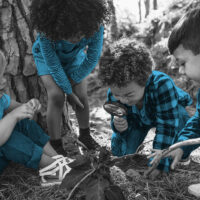Research is increasingly showing the benefits of spending time outdoors on our mental health. These studies are often about adults rather than children and young people, and about how spending free time outdoors can be of benefit. However, there is less known about how and why we might support young people to be outdoors to prevent mental health problems, or in treatment settings if they do have poor mental health.
About the event
In this event, we will hear from three speakers who have researched different aspects of this topic. First, we will explore outdoor time as a mechanism to reduce mental health problems at a public health level, hearing the results of the Open Sky School randomised controlled trial conducted in Canada. Then, we will think about how Child and Adolescent Mental Health Services (CAMHS) deliver treatments, with the “CAMHS goes wild” project showcasing outdoor treatment delivery for those with moderate mental health difficulties. Finally, we will demonstrate how nature and the outdoors can be incorporated for those with severe mental health problems, learning from the NatureWell CAMHS qualitative service evaluation.
Key learning points
- To understand whether or not robust evaluation of an outdoor based intervention for school children demonstrates evidence that this reduces mental health problems for children
- To learn about approaches to integrate the outdoors into mental health prevention and treatment in CAMHS
- To think critically about how and why attendees could integrate more outdoor activities, or evaluate these, to add to the evidence base
Who should attend
Practitioners in clinical, education, health or social care roles, school staff working with children and families, charities and third sector organisations supporting children and families, academics and researchers.
About the talks
Associate Professor Dr. Marie-Claude Geoffroy – ‘Open Sky School: findings from a randomised controlled trial testing the effectiveness of a nature-based intervention on the mental health of elementary school children’
Spending time in nature has been associated to positive outcomes for mental health in observational studies. However, experimental research in this domain is lacking and little is known about the effectiveness of nature-based interventions with an emphasis on greenspace exposure for reducing children’s mental heath symptoms in school settings. We conducted a cluster randomized control trial to test the effectiveness of Open Sky School, a 12-week intervention designed to reduce emotional (e.g. internalizing and externalizing symptoms) and social problems in school-aged children residing in Quebec, Canada. 53 teachers from 33 schools and 1015 of their 5th and 6th grade students were randomly assigned to an intervention or waitlist control group. Teachers in the intervention group dedicated 2 hours per week over 12 weeks to mental health and pedagogical activities in greenspaces located in close proximity to their schools. Those in the control group practiced education as usual. We explored whether mental health symptoms were reduced immediately following the 12-week intervention. This talk will present the results of the Open Sky School study, shedding light on the children the intervention may support, while also underlining the program’s development, implementation, and teachers’ experiences conducting the program. We will also explore the feasibility of implementing outdoor interventions in light of our study’s findings.
Key learning points
- To understand whether Open Sky School can reduce mental health problems for school-aged children.
- To outline the development and implementation of Open Sky School, including details on how teachers were trained and supported to implement the intervention.
- To understand the practical challenges, benefits, and implications of integrating nature-based interventions in school settings.
Dr. Beth Chapman – ‘CAMHS Goes Wild’
Demand on Child and Adolescent Mental Health Services continues to increase, whilst recruiting and retaining staff remains challenging. This talk will summarise the findings of our mixed methods study exploring the views of staff on using nature-based approaches in CAMHS. In particular it highlights how respondents associate potential benefits for staff retention and wellbeing with working in this way. It links theory with possible benefits for patients that were identified by staff and also summarises their concerns. The role of patient and public involvement will be described and the way in which combining patient and staff voice can support clear communication with stakeholders.
Key learning points
- To understand the current levels of burn-out and wellbeing in CAMHS staff.
- To consider the potential benefits and challenges of having a nature-based CAMHS service and how this may link with A.
- To consider example physiological mechanisms for potential benefit.
- To reflect on the use of PPIE at all stages of this project.
Dr. Catriona Mellor – ‘Bringing nature into CAMHS inpatient services: reflections on NatureWell CAMHS’
The evidence is mounting to show what many intuitively feel, that time outdoors and connection with nature are of central importance to mental health and wellbeing. Yet, during an inpatient admission, when perhaps most needed, young people may have very limited access to either. This talk will share learning and reflections from the work on Marlborough House adolescent Unit which has been attempting to tackle this issue by weaving nature into the daily routine, into care plans and treatment as well as into staff wellbeing initiatives. It will touch on the obstacles faced as well as what has facilitated change, the role of training, the importance of developing a community of practice and the benefits of partnership working. The talk will include feedback from staff and patients and will offer the audience examples of ‘easy wins’ as well as more involved intervention design. This is a new, emerging field that we all have ‘expertise’ in (how being outdoors impacts wellbeing), so there will be time for discussion and a recognition of the many questions that remain unanswered.
Key learning points
- To understand the impact of (and difference between) contact with nature and nature connectedness and how a recognition of this can enhance the care we offer.
- To discuss feasible and accessible methods of weaving increased nature contact and connectedness into the care offered in an adolescent inpatient setting.
- To describe systemic factors that can facilitate or obstruct change.
- To consider the role of nature connection in own life and practice.
About the speakers

Marie-Claude is a clinical psychologist and an Associate Professor in the Department of Psychiatry at McGill University and the Douglas Mental Health University Institute. She holds a Canada Research Chair in Youth Suicide Prevention and Mental Health Promotion and is a member of the College of New Scholars of the Royal Society of Canada. With over 100 peer-reviewed articles, including in influential journals such as Lancet Psychiatry, JAMA Psychiatry, and the Canadian Medical Association Journal, her research focuses on understanding the social determinants that influence suicide in youth; improving the mental well-being of all youth; preventing suicide in vulnerable youth through preventative strategies; and disseminating knowledge to raise awareness about youth mental health and inspire hope. She leads a Quebec inter-university research initiative on youth suicide prevention and advises on various governmental and non-governmental suicide prevention initiatives in Quebec, Canada, and worldwide.

Beth is a Consultant Psychiatrist working in Community CAMHS, and is lead for CAMHS research in her trust. Under the Mental Health Research Initiative (PenARC), Beth was Chief Investigator for a study exploring the views of staff on using nature-based approaches within clinical practice. Beth is now leading on the implementation of CAMHS Goes Wild; embedding nature-based approaches within care options and linking this with trust and system level objectives around sustainability and carbon reduction.

Dr. Catriona Mellor has temporarily stepped back from her clinical practice as a Child and Adolescent Psychiatrist to dedicate more time to investigating how nature and climate are linked to child and adolescent mental health. In 2021 she was involved in a major publication in the journal Lancet Planetary Health about climate anxiety in a sample of 10,000 young people globally, she is involved in the design and evaluation of nature-based health interventions in the NHS, and in the delivery of Nature Connectedness training to mental health staff. In anticipation of predicted legal changes she is training in psychedelic-assisted therapy (adult) and exploring how nature-based models support this work.

